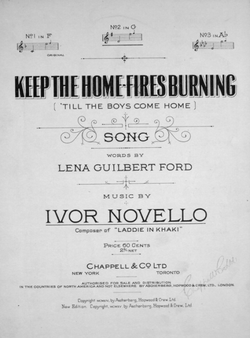| "Keep the Home-Fires Burning" | |
|---|---|
 Sheet music cover (1915 edition) | |
| Song | |
| Written | 1914 |
| Composer | Ivor Novello |
| Lyricist | Lena Guilbert Ford |
"Keep the Home-Fires Burning (Till the Boys Come Home)" is a British patriotic First World War song composed in 1914 by Ivor Novello with words by Lena Guilbert Ford (whose middle name was sometimes printed as "Gilbert"). [1]
Contents
The song was published first as "'Till the Boys Come Home" on 8 October 1914 by Ascherberg, Hopwood and Crew Ltd. in London. [2] A new edition was printed in 1915 with the name "Keep the Home-Fires Burning". [2] The song became very popular in the United Kingdom during the war, along with "It's a Long Way to Tipperary".[ citation needed ]
James F. Harrison recorded "Keep the Home-Fires Burning" in 1915, as did Stanley Kirkby in 1916. Another popular recording was sung by tenor John McCormack in 1917, who was also the first to record "It's a Long Way to Tipperary" in 1914. (See External links below to hear these recordings of "Keep the Home-Fires Burning".) Other versions include one by Frederick J. Wheeler and one by the duet Reed Miller & Frederick Wheeler. [3]
The lyricist Lena Ford was killed in March 1918 during a German air raid on her home in Warrington Crescent in Maida Vale. [4] There is a misconception that Ivor Novello's mother wrote the lyrics for the song (propagated—for example—by patter in recorded performances of British musical comedy duo Hinge and Bracket) but Lena Ford (an American) was a friend and collaborator of Novello, not a blood relation.[ citation needed ]
The opening of the melody bears a resemblance to Gustav Holst's setting of the Christmas carol "In the Bleak Midwinter".[ citation needed ]
